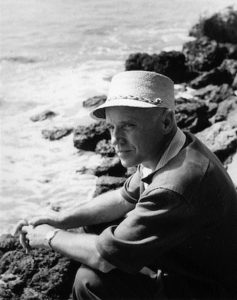
William Bradford Huie
*William "Bill" Huie was born on this date in 1910. He was a white-American journalist and author whose work intersected with the 20th-century American Civil Rights movement.
Born in Hartselle, Alabama, William Bradford Huie was the son of John Bradford and Margaret Lois (Brindley) Huie and the eldest of three children. He attended Morgan County High School and graduated as a class valedictorian. He attended the University of Alabama, graduating Phi Beta Kappa in 1930. From 1932 to 1936, Huie worked as a journalist for the Birmingham Post newspaper. In 1934, he married his grammar school sweetheart, Ruth Puckett. Their wedding took place in her parents' home in Hartselle.
In late 1938, Huie was in Los Angeles and worked independently as an undercover reporter to gather information on gangster Benjamin "Bugsy" Siegel. He reported on his experiences in the Los Angeles Times and later in the December 1950 issue of The American Mercury, a literary magazine. In the late 1950s, Huie and his wife resettled permanently in their native Hartselle. Ruth worked as a first-grade schoolteacher. Huie continued to write full-time at home as a freelance journalist and novelist. Racial activism in the Civil Rights Movement increased during the first half of the 20th century. Huie was commissioned by periodicals such as the New York Herald Tribune and Look magazine to cover breaking events in the South.
In 1954, the US Supreme Court ruled that segregated public schools were unconstitutional, but most southern jurisdictions did not change their schools. Huie attended the appeal and the second trial in 1954 of Ruby McCollum, a wealthy married black woman in Florida who had shot and killed her white paramour, physician, and state senator-elect Dr. Leroy Adams. Huie had been contacted about the case by writer Zora Neale Hurston, who had worked with him earlier for the Pittsburgh Courier.
The judge had prohibited McCollum from talking to the press. Huie attended the appeal and second trial and conducted background investigations of the figures and events. He was arrested on contempt of court charges; the judge cited him for "meddling" in a trial that "could embarrass the community." Huie was soon released from jail, and he was pardoned years later. His book on the sensational case, Ruby McCollum: Woman in the Suwannee Jail (1956), became a bestseller and was banned in Florida. Ebony, Time, and other journals publicized McCollum's story worldwide.
Huie also reported on the murder of Chicago teenager Emmett Till in Mississippi in 1955. After an all-white jury found the two defendants not guilty, Huie paid the men $4,000 for an interview. They described how and why they committed the murder and were protected by double jeopardy from being tried again. Huie published his account in Look magazine in January 1956. Some mainstream journalists criticized what they called his "checkbook journalism." Huie also reported on various Ku Klux Klan activities, including the 1964 killing of "Freedom Summer" workers James Chaney, Andrew Goodman, and Michael Schwerner.
His books on the latter included The Klansman (1965) and Three Lives for Mississippi (1965). The KKK burned a cross on his front lawn in 1967 to intimidate him. Dr. Martin Luther King, Jr. wrote the Introduction for the second edition of Huie's Three Lives for Mississippi. He said that it "is a part of the arsenal decent Americans can employ to make democracy for all truly a birthright and not a distant dream. It relates the story of an atrocity committed on our doorstep." In 1970, Huie published He Slew the Dreamer, an account of the Memphis assassination of King, for which he had interviewed assassin James Earl Ray.
On November 20, 1986, Huie died of a heart attack. He left an unfinished novel, "The Adversary," which was intended to be the second of a trilogy that began with In the Hours of Night. Martha Huie, his widow and heir, continued representing her late husband's literary properties. She managed ongoing projects until she died in Memphis in May 2014. Martha Huie's daughter, Mary Ben Heflin, now handles William Bradford Huie's literary properties and ongoing projects.